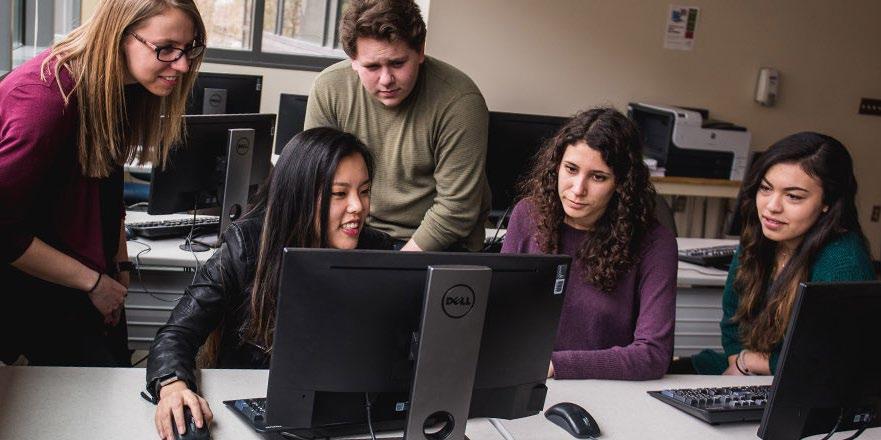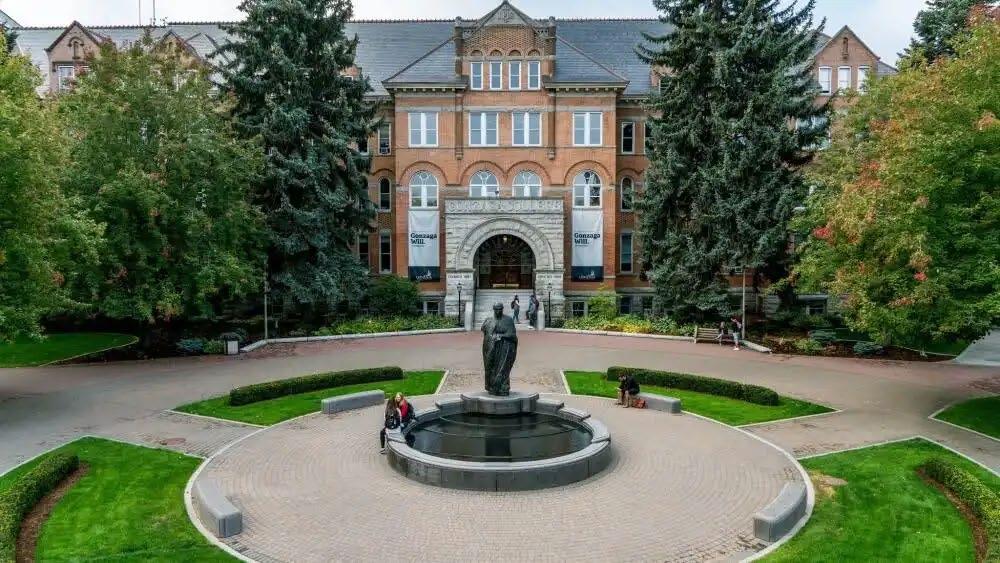A New Institute for Informatics and Applied Technology at Gonzaga
Context

Gonzaga University understands that information science and technology are matters not only of economic security but also of regional and national security and individual well-being. The U.S. departments of Homeland Security and Commerce each have dedicated portions of their mission to protecting the nation’s infrastructure in cyberspace. As healthcare becomes increasingly reliant on big data to inform practice and outcomes, harnessing that data for clinicians and researchers and protecting it will be critical to the thriving healthcare infrastructure for distributed areas such as the Inland Pacific Northwest. In addition to healthcare, industries such as aerospace, computing, advanced agriculture, materials science, and software management are already central to the Pacific Northwest economy.
At the same time, the CHIPS and Science Act of 2022 an unprecedented $280 billion investment in American energy innovation and independence seeks to enhance U.S. competitiveness, drive innovation and strengthen national security. In addition to prioritizing domestic semiconductor manufacturing capacity, the historic investment is designed to catalyze R&D and commercialization of emerging technologies, establish regional tech hubs, and create and larger, better trained, ethically-minded, and more diverse STEM workforce.
The Opportunity
Against this backdrop, Gonzaga University will establish the Institute for Informatics and Applied Technology. The Institute will bring together faculty expertise from across the University to collaborate with and support local industries, clinical health providers, and institutional partners such as the University of Washington School of Medicine.
The Institute will drive development of new degree programs, certificates, and executive education in areas such as software management, data science, AI, cybersecurity, and bioinformatics. Moreover, through the new Institute, Gonzaga seeks to inspire discovery and create new knowledge that will help answer increasingly pressing questions such as:
▪ How can complementary economic policies create opportunities for struggling domestic labor sectors?
▪ How can domestic vertical integration mitigate the nation’s vulnerability to unpredictable international affairs and geopolitical unrest?
▪ How can we harness big data and AI to improve healthcare and health outcomes, to address global supply chain congestion, and to catalyze innovation in technology?
▪ How can we better secure the nation’s cyber infrastructure and enhance information security for private and public sector institutions and individuals?
▪ How can we mitigate the effects of global market forces on the regional and national economy and workforce while enhancing security in an increasingly interconnected world?
Gonzaga envisions external funding from federal agencies such as DoD, DHS, NIH, and NSA, as well as new opportunities created by the CHIPS Act such as NIST or NSF regional hub initiatives. The President’s Council of Advisors on Science and Technology has proposed that the Commerce Department pursue a geographically distributed model for CHIPS R&D funding, including at least 50 “hub” universities and colleges geographically distributed across the country.
Gonzaga University
2
Inaugural
David and Cathleen Reisenauer Family Director INSTITUTE FOR INFORMATICS AND APPLIED TECHNOLOGY
Opportunities and Expectations for Leadership
The inaugural Director will advance a strategic, transformational vision for a new Institute for Informatics and Applied Technology at Gonzaga University. The Director will foster and enhance a culture of interdisciplinary research and collaboration across the University and with other institutions and external partners, leveraging synergies to advance data science, informatics and applied technology at Gonzaga.
Specifically, the inaugural Director will be expected to:
▪ Bring together collaborators from across Gonzaga University
The Director will assemble core faculty from the College of Arts and Sciences, School of Engineering and Applied Science, School of Business Administration, and School of Law, drawn from departments such as Biology, Computer Science, Management Information Systems, Mathematics, Mechanical Engineering, Psychology, and Supply Chain.
▪ Develop and deploy new interdisciplinary programs
Under the Director’s leadership, the Institute will serve as an incubator for new academic programs that align with the Institute’s research activities. Building on exploratory efforts already underway, this will include new undergraduate and graduate degree programs as well as certificates and executive education in such areas as informatics, cybersecurity, data science, data analytics, and IT management.
▪ Cultivate strategic relationships and partnerships and generate resources

The Director will develop partnerships with government agencies, other universities, think tanks, private industry, foundations, and other entities. Through these relationships, the Director will generate support for research and strategic initiatives, create opportunities for Gonzaga students and faculty, and elevate the University’s contribution to the nation’s competitiveness, innovation, and technological self-sufficiency.
▪
Support benefaction to the University
The Director will work with University Advancement, the Provost, and the President to develop and maintain relationships with alumni and friends of the University to spearhead benefaction to support the Institute.
▪
Foster inclusion and community across STEM disciplines at Gonzaga
By fostering an authentic commitment to and shared accountability for diversity and equity across STEM fields at the University, the Director will establish the Institute as an exemplar of both interdisciplinary collaboration and inclusive excellence at Gonzaga.
▪ Elevate Gonzaga’s public presence
By creating a highly visible public presence for the Institute, the Director will enhance Gonzaga’s visibility regionally, nationally, and globally, providing thought leadership and representing the University on issues and topics relevant to data science, cybersecurity, and applied technology on the national and international stages.
▪ Provide institutional stewardship
Reporting directly to Provost Sacha Kopp, the Director will serve on the Council of Deans and help articulate a shared vision for academic and research excellence and play an integral role stewarding Gonzaga’s mission as a Jesuit, Catholic, and humanistic institution.
Gonzaga University
3
Inaugural
Professional Qualifications and Personal Qualities
Gonzaga University seeks an innovative, visionary, and strategic leader to serve as the inaugural David and Cathleen Reisenauer Family Director of the Institute for Informatics and Applied Technology.
The successful candidate will have substantial expertise in data science and cybersecurity as well as prior experience developing strategic partnerships and identifying external funding opportunities. An earned doctoral degree in a related field is required.
To serve effectively as a steward of Gonzaga University, the Director will possess an appreciation of Ignatian pedagogy and the Jesuit charisms to care for the development of the whole person in mind, body, and spirit; to cultivate leaders of purpose; and to stand with the vulnerable.
In addition, the ideal candidate will possess the following:
Scholarly excellence and subject matter expertise
▪ An established research portfolio in such areas as data science, informatics, and cybersecurity.

▪ A broad understanding of issues spanning these disciplines and of their applicability in domains including, but not limited to, health and healthcare, transportation and supply chain, and homeland and national security.
▪ A record of extramural funding, preferably in partnership with regional economic interests, and working with state and federal agencies.
▪ A commitment to interdisciplinary collaboration and research, and the ability to foster scholarly activity and a robust research enterprise across the Institute.
Collaborative leadership
▪ Demonstrable success as a facilitator, convener, and organizer who creates hospitable space for dialogue and engagement.
▪ A record of effectively cultivating rapport with faculty, investigators, staff, students, institutional leaders, and other colleagues.
Academic leadership and management
▪ Familiarity with undergraduate programs and a commitment to student formation.
▪ Experience with graduate education and interdisciplinary and online programs.
▪ A record of successful recruitment, mentorship, professional development, and retention of faculty and staff.
Commitment to external engagement and partnership
▪ A record of effective outreach and engagement with external partners, and the ability to steward strategic relationships.
Fiscal, operational, and fundraising acumen
▪ Experience managing a complex organization with multiple stakeholders.
▪ An understanding of university systems, financial management, strategic budgeting and resource allocation, and advancement.
4
Gonzaga
University Founding Director, Institute for Informatics & Applied Technology
About Gonzaga University Overview


When Gonzaga College opened on September 17, 1887, there were seven students enrolled. They included boys from Spokane Falls; Fort Sherman and Lewiston, Idaho; Salem, Oregon; and one from California. Today, Gonzaga University has grown to a coed enrollment of approximately 7,500. The faculty and staff has increased from 17 Jesuits to over 2,000 people. Gonzaga’s campus now includes 103 buildings on 152 acres.
Ranked among the nation’s 54 most beautiful campuses by Conde Nast Traveler Magazine, the University campus has grown dramatically from its original, iconic “College Hall” building, including the new John and Joan Bollier Center for Integrated Sciences and Engineering, a beautiful Jundt Art Museum, the McCarthey Athletic Center, the Myrtle Woldson Performing Arts Center, and the John J. Hemmingson University Center.
In 2022, Gonzaga partnered with the University of Washington to open its School of Medicine Spokane campus, a beautiful building that also houses Gonzaga’s human physiology department.
Gonzaga graduate students have the opportunity to participate in international immersion programs, including at Gonzaga’s campus in Florence, Italy.
Gonzaga has never lost its primary purpose. The University continues to offer students a quality Jesuit education, teaching people the skills they need to help shape and transform our world today.
Gonzaga’s liberal arts and applied professional graduate programs focus on developing the whole person: mind, body, and spirit. Helping students to become people of curiosity, courage and conviction.
Gonzaga University
5
Inaugural David and Cathleen Reisenauer Family Director INSTITUTE FOR INFORMATICS AND APPLIED TECHNOLOGY
Mission Statement

Gonzaga University is an exemplary learning community that educates students for lives of leadership and service for the common good. In keeping with its Catholic, Jesuit, and humanistic heritage and identity, Gonzaga models and expects excellence in academic and professional pursuits and intentionally develops the whole person intellectually, spiritually, culturally, physically, and emotionally.
Through engagement with knowledge, wisdom, and questions informed by classical and contemporary perspectives, Gonzaga cultivates in its students the capacities and dispositions for reflective and critical thought, lifelong learning, spiritual growth, ethical discernment, creativity, and innovation.
The Gonzaga experience fosters a mature commitment to dignity of the human person, social justice, diversity, intercultural competence, global engagement, solidarity with the poor and vulnerable, and care for the planet. Grateful to God, the Gonzaga community carries out this mission with responsible stewardship of our physical, financial, and human resources.
 Gonzaga University
Gonzaga University
6
Inaugural David and Cathleen Reisenauer Family Director INSTITUTE FOR INFORMATICS AND APPLIED TECHNOLOGY
Inaugural David and Cathleen Reisenauer Family Director INSTITUTE FOR INFORMATICS AND APPLIED TECHNOLOGY

Strategic Plan
Since 2015, Gonzaga University has been guided by a strategic plan centered on three institutional priorities:
▪ Being an exemplar of American Jesuit higher education
▪ Academic and educational excellence across all programs
▪ A commitment to institutional viability and sustainability.
Acknowledging that Gonzaga operates in an active, relational context possessed of mutual accountabilities, these institutional priorities were further elaborated through the following commitments, each of which contained strategic objectives that served as declarations of continuous improvement:
▪ Foster responsibility for shared mission
▪ Animate academic excellence across the institution
▪ Provide an integrative Jesuit educational experience for Gonzaga’s students
▪ Optimize institutional stewardship and sustainability.
In August 2022, President McCulloh announced that while the broad commitments of the strategic plan remained unchanged, many of the goals and concrete actions established in 2015 had largely been accomplished. President McCulloh asked Provost Sacha Kopp to lead the campus through a process to update the strategic plan.
Reminded of St. Ignatius’ admonition to “set the world on fire”, Gonzaga has since undertaken a “Grand Challenge” process through which the campus community has been invited to submit proposals in response to five questions:
▪ For what themes in academic research, scholarship, and creative activities will Gonzaga be known?
▪ What distinctive experiences does Gonzaga desire for its students as a Jesuit university?
▪ What degree plans must Gonzaga explore to remain current in the 21st century?
▪ What formative experiences does the university want to offer faculty, staff, and students as part of their development as whole persons?
▪ How will Gonzaga ensure its sustainability and stewardship?
Gonzaga’s updated strategic plan will be released in Summer 2023. In alignment with the forthcoming update to the plan, the Institute for Informatics and Applied Technology will advance the University’s academic mission, spearhead partnerships with local and regional business and government agencies, and position Gonzaga to play a leading role in workforce development, economic growth, and national security.
Gonzaga University
7
Rankings and Recognition
For the fourth consecutive year, Gonzaga is ranked among the top 100 National Universities by U.S. News & World Report, currently at #83, including elite private schools and large state research institutions. Other accolades include:
▪ Ranked in the top 19% among National Universities (U.S. News & World Report, 2023)
▪ No. 12 for best undergraduate teaching, among National Universities (U.S. News & World Report, 2023)
▪ Ranked 142nd for Best Colleges for Veterans (U.S. News & World Report, 2022)
▪ Included among the 300-plus “best and most interesting” U.S., Canadian, British and Irish colleges and universities (Fiske Guide to Colleges, 2021)

▪ Best schools for veterans, their spouses and military families (2021–2022 Military Friendly)
▪ Named to The Princeton Review’s “Best 388 Colleges for 2023”
▪ No. 21 best value among private universities in the nation (Kiplinger’s Personal Finance Magazine, 2019)
▪ No. 62 best value among all colleges and universities (public and private) nationwide (Kiplinger’s Personal Finance Magazine, 2019)
▪ Named to Money’s “2020 Best Colleges” list based on value
▪ Among the nation’s best-value universities for students seeking outstanding academics and superb career preparation at an affordable price with generous financial aid (Princeton Review’s Colleges That Pay You Back, 2018)
▪ No. 1 Best Value College in Washington (Niche, 2022)
 Gonzaga University
Gonzaga University
8
Inaugural David and Cathleen Reisenauer Family Director INSTITUTE FOR INFORMATICS AND APPLIED
TECHNOLOGY
Academics and Research
Gonzaga offers 16 undergraduate degrees through 49 majors, 58 minors and 49 concentrations, 25 master’s degrees and 6 doctoral-level degrees. In addition, research, scholarship, and creative productivity occupy critical roles among the faculty, who bring knowledge, insights, and skills from their discipline into the classroom, laboratory, or studio space. Students benefit through opportunities to learn, research, and engage in creative endeavors under the guidance of expert professors.
Colleges and Schools
▪ College of Arts and Sciences
▪ School of Business
▪ School of Education
▪ School of Engineering & Applied Science
▪ School of Nursing and Human Physiology
▪ School of Leadership Studies
▪ School of Law
Centers and Institutes

▪ Center for Climate, Society, and the Environment
▪ Center for Global Engagement
▪ Center for Lifelong Learning
▪ Center for Student Academic Success

▪ Center for the Study of Hate
▪ Center for Undergraduate Research & Creative Inquiry
▪ Unity Multicultural Education Center
Gonzaga University
9
Inaugural David and Cathleen Reisenauer Family Director INSTITUTE FOR INFORMATICS AND APPLIED TECHNOLOGY
University Leadership

Thayne McCulloh, President
Thayne McCulloh is serving in his 13th year as President of Gonzaga University. Dr. McCulloh holds a B.A. from Gonzaga (‘89) and was awarded a D.Phil. in experimental social psychology from Oxford University, England (1998). He began working at Gonzaga in 1990, and from his roots in student affairs has remained fundamentally focused on students. He is deeply committed to a broadly-based liberal arts education that prepares students to be critical thinkers, outstanding professionals, and living exemplars of the Jesuit imperative to be people with and for others.

Dr. McCulloh’s tenure has been one marked by initiatives related to community engagement, institutional sustainability, and increase in institutional prestige and recognition. More than $200M in new construction and campus improvements have been completed since his inauguration in 2010. Gonzaga University launched its most ambitious fundraising effort to date, the “Gonzaga Will” campaign, in October 2015, raising $355 million from more than 40,000 donors when it closed in 2018.
A committed leader in Catholic and Jesuit higher education, Dr. McCulloh currently serves as vice chair of the Northwest Commission on Colleges and Universities, is vice chair of the Association of Jesuit Colleges and Universities, and has been recognized by the National Association of Student Personnel Administrators for his unwavering commitment to students. He has been actively involved in the Spokane University District Public Development Authority and Development Association, has served as a member of the Providence Health and Services board, is a member of the Nazareth Guild board of directors, among other organizations.
Sacha Kopp, Provost

Sacha Kopp joined Gonzaga University as Provost and Chief Academic Officer in June 2022. A graduate of the University of Chicago, Dr. Kopp has been an advocate of liberal arts education, supporting innovative new programs and enrollment efforts. He has a strong history of work related to diversity, equity, access and inclusion that combines both strategy and implementation to support underrepresented populations.
A committed advocate for students, Dr. Kopp has addressed student success and retention at multiple institutions. He has contributed to student affairs and admissions efforts, as well as faculty training to impact student success. He also led the creation of partnerships with local corporations and organizations to foster continuing education opportunities. Dr. Kopp is an advocate of the teacher-scholar model, and has sought to expand research and creative opportunities for both faculty and students.
A physicist by training, Dr. Kopp is author or co-author of over 200 articles in the fields of elementary particle physics and in STEM education. He conducted research at particle accelerators in Chicago, Cornell, Geneva Switzerland, and Japan. Prior to serving in his current role, he held roles as Senior Vice Chancellor for Academic Affairs at the University of Nebraska at Omaha; Dean of the College of Arts and Sciences at the State University of New York at Stony Brook; Associate Dean for Undergraduate Education in the College of Natural Sciences at the University of Texas; and Associate Chair of the Department of Physics at the University of Texas. He previously served on the faculty of the Physics Department at UT Austin. His education includes an AB in Physics from the University of Chicago, MS in Physics from the University of Chicago, PhD in Physics from the University of Chicago, and a postdoctoral fellowship at Syracuse University.
Gonzaga University
10
Inaugural David and Cathleen Reisenauer Family Director INSTITUTE FOR INFORMATICS AND APPLIED TECHNOLOGY
Spokane, Washington
Gonzaga is less than half a mile from downtown Spokane, Washington, and 15 minutes from the Spokane International Airport. The city is epitomized by its slogan, “Creative by Nature,” offering vast opportunities for a range of interests, including the arts, sports, or a multitude of outdoor activities. Spokane’s population is more than 222,000, with the Greater Spokane area encompassing approximately 573,000 people. The city is lauded for good weather, excellent schools, an abundance of parks, and stunning natural scenery.
The bustling city is surrounded by natural beauty: parks, pine tree forests, mountains, lakes and rivers. The region’s scenic setting offers unlimited opportunities for enjoying the Northwest’s great outdoors. The area’s 76 lakes, three skiing areas, 33 golf courses and three major shopping malls offer students and faculty a variety of off-campus pursuits. Multiple music venues, live theater and Broadway plays, the Spokane Symphony, three professional sports teams, and a vital downtown shopping and entertainment district add a lively spirit to the mix.
Numerous independent restaurants feature local and organic food and emphasize sustainable eating practices. Wine enthusiasts can visit a number of tasting rooms and wineries all within close proximity of one another. In addition to award-winning wine, new craft breweries are popping up all over the city.
Spokane has been selected as an All-America City three times in the past 41 years, including in 2015 when it was one of 10 honored throughout the country. In recent years, Parenting Magazine ranked Spokane one of the top 10 places to raise a family. In a 2017 MarketWatch report, Spokane was ranked the #1 city in the U.S. to save money. Spokane also ranks as the top city in the U.S. for freelancers, and has been selected as the best place to live on a six- figure salary.
Spokane was recently named a “City on the Rise” by National Geographic Traveler Magazine for “unconventional metrics that produce happiness: green spaces, coffee shops, breweries, music venues, Instagrammable moments and puppies.”

Learn more about Spokane
 Gonzaga University
Gonzaga University
TECHNOLOGY 11
Inaugural David and Cathleen Reisenauer Family Director INSTITUTE FOR
INFORMATICS AND APPLIED
Procedure for Candidacy
Inquiries, nominations and applications are invited. Candidates will be considered until an appointment is made.
Candidates should provide a CV and letter of application that addresses the responsibilities and requirements described in this leadership profile. Application materials should be submitted using WittKieffer’s candidate portal.
Nominations and inquiries can be directed to the consultants:
Philip Tang and Zachary Durst
GonzagaInformatics@wittkieffer.com

The salary range for this position is $200,000 to $250,000. Pay is based on several factors including but not limited to education, work experience, certifications, geographic location, etc. In addition to salary, Gonzaga University offers benefits such as, comprehensive benefits package, tuition waiver and 401k contribution (all benefits are subject to eligibility requirements).
Gonzaga University is a Jesuit, Catholic, humanistic institution, and is therefore interested in candidates who will contribute to its distinctive mission. Gonzaga University is a committed EEO/AA employer and diversity candidates are encouraged to apply. All qualified applicants will receive consideration for employment without regard to their disability status and/or protected veteran status.
 Gonzaga University
Gonzaga University
12
Inaugural David and Cathleen Reisenauer Family Director INSTITUTE FOR INFORMATICS AND APPLIED TECHNOLOGY

 David and Cathleen Reisenauer Family Director INSTITUTE FOR INFORMATICS AND APPLIED TECHNOLOGY
David and Cathleen Reisenauer Family Director INSTITUTE FOR INFORMATICS AND APPLIED TECHNOLOGY


 Gonzaga University
Gonzaga University
 Gonzaga University
Gonzaga University




 Gonzaga University
Gonzaga University